African Beverages: Basic Overview
Common Ingredients
Common Preparing Methods
Key Taste
Drinking Etiquette
Culinary Festivals
Influence and Fusion
Classifications of African Beverages
-
Alcoholic Beverages
These drinks commonly use local ingredients such as sorghum, millet, honey, and fruits.
They are local beers and wines with rich, earthy notes to potent spirits and sweet, fermented brews.
Many alcoholic drinks are essential in social ceremonies, celebrations, and daily life.
-
Non-alcoholic Beverages
Non-alcoholic drinks in Africa feature local fruits and herbs, offering tasty flavors and health benefits.
They range from refreshing fruit juices to nourishing herbal teas.
Many of them are recipes passed down through generations.
African beverages are a splash of vibrant colors and mesmerizing tastes, spanning from traditional homemade brews to modern-day drinks.
With Africa’s varied climate and bountiful natural resources, these drinks range from the fermenting artistry behind palm wine and the tangy zest of hibiscus tea to the globally recognized Ethiopian coffee and unique creations like Amarula cream liqueur.
Key regions contribute distinct flavors; Ethiopia’s ancient coffee culture, South Africa’s innovative wine and spirit production, and West Africa’s rich tradition of non-alcoholic refreshments like ginger beer.
Traditional methods of preparation have been passed down through generations, involving fermentation, brewing, boiling, etc., and using local ingredients, such as millet, sorghum, honey, ginger, hibiscus flowers, coffee beans, and fruits.
Here, you’ll get to know 25 beloved drinks across Africa. You’ll also learn about the continent’s drinking culture and its global popularity.
After that, I’ll provide some insights regarding the traits of five regional beverages in Africa, including, Central, East, North, Southern, and West Africa. Some drinks also offer unique health benefits, which will be discussed later.
Finally, there are some suggestions to pair drinks with dishes in African style. So join me on an exploration of these beverages with a comprehensive view.
25 Popular African Dishes with Filters
Below are the best 25 drinks in Africa, arranged by popularity and including advanced search options, such as ingredients, taste, and how each drink is made.
This guide also caters to all preferences, from most popular, national, traditional, street drinks, or exotic ones.
Widely enjoyed across Africa, these beverages are found in numerous settings, from local homes to restaurants, and are enjoyed by individuals of all ages.
They are signature drinks representing the culture of African countries, often with deep-rooted historical significance.
Heritage-rich drinks passed down through generations, embodying the authentic flavors and traditions of Africa, typically savored during traditional ceremonies and communal gatherings.
They are common and beloved refreshments sold by street vendors. Street beverages are convenient and cheap.
Thanks to the continent’s rich biodiversity, Africa’s exotic beverages use unique ingredients like baobab fruit, hibiscus, and more.
Fusion African drinks combine traditional ingredients in the continent with global culinary influences, reflecting the continent’s adaptability.
Palm Wine
- Alcoholic
- Traditional
Palm wine in Africa is created from the sap of palm trees like coconut palm, date palm, and palmyra, blending tastes from sweet to sour. African versions often use date palm, jaggery palm, or palmyra.
As a versatile beverage, palm wine plays a pivotal role in various Central and Western African ceremonies, marking birthdays, weddings, and funerals. In Africa, it’s known by many names, one of them being ‘Mmanya Ocha.’
It’s a drink for everyone, men and women alike, though women tend to savor it in more private settings.
Ginger Beer
- Non-Alcoholic
- Traditional
Ginger beer in Africa is a popular, traditional, non-alcoholic beverage, although there are alcoholic versions as well. It is made by fermenting ginger, sugar, and water, sometimes with the addition of lemon juice or pineapple.
Ginger beer holds a special place in the hearts of folks from West Africa to South Africa and even in the USA, Canada, Britain, and Ireland.
The flavor profile varies from region to region in Africa, yet ginger remains the undeniable favorite, possessing a spicy touch.
Rooibos Tea
- Non-Alcoholic
- National
- Traditional
Rooibos tea, with its alternative names of red tea, bush tea, or redbush tea, is a herbal infusion from South Africa. It derives from the leaves of the Aspalathus linearis plant. The drink has an earthy and nutty flavor, minus the caffeine.
Locals often enhance it with lemon, milk, or sugar. Rooibos is a fantastic swap for your regular tea or coffee. Plus, it’s brimming with antioxidants, helping reduce inflammation.
However, you should have Rooibos moderately, like drinking 10 cups a day might result in liver problems.
Hibiscus Tea
- Non-Alcoholic
- Street Beverages
- Traditional
Hibiscus tea, known as bissap in West Africa, zobo in Nigeria, or sobolo in Ghana, is a caffeine-free beverage, draws its essence from dried roselle hibiscus flowers. Once steeped for about five minutes, the flowers yield a vibrant red infusion and a tart, cranberry-like flavor.
This versatile tea can be enjoyed both hot and cold, with the latter version, roselle juice, being quite popular in West African countries. Also, hibiscus is often flavored with sugar or honey, mint or ginger for a distinctive twist.
As a rich source of antioxidants, high vitamin C content, and blood pressure regulation properties.
Maghrebi Mint Tea
- Non-Alcoholic
- National
- Traditional
Walking through the streets of Morocco and Algeria in Africa, you can’t miss the Maghrebi mint tea, a staple available throughout the day. It’s a refreshing blend of gunpowder green tea, fresh mint leaves, and sugar.
Commonly, when boiling water meets the tea in a teapot, people infuse the mix for at least 15 minutes, with the leaves remaining in the pot. These teapots, fascinatingly, range in size, catering from 6 to 12 glasses.
Locals have a flair for pouring the tea high to create a frothy top. This drink is also a symbol of hospitality, traditionally prepared by the family’s male head and served to guests in three rounds before refilling the pot with boiling hot water.
Coffee
- Non-Alcoholic
- Street Beverages
- Traditional
Ethiopia in Africa is known as the birthplace of coffee, celebrating for its prominent coffee heritage and diverse varieties.
With the country ranked among the top five coffee producers globally, it’s no surprise that Ethiopia is Africa’s largest coffee consumer.
Beyond Ethiopia, countries like Kenya, Uganda, and Ivory Coast are also major coffee producers.
Amarula
- Alcoholic
- Exotic
- Traditional
Amarula is a creamy liqueur from South Africa. This velvety drink is crafted from the fruit of the African marula tree (Sclerocarya birrea), mixed with cream and sugar.
Since 1989, the Southern Liqueur Company has been making Amarula, which has an alcohol content of 17%.
It tastes a bit like Baileys, but with a fruity caramel twist. You can enjoy Amarula by itself, with ice, or mixed into different cocktails for a slightly alcoholic treat.
Tej
- Alcoholic
- National
- Traditional
Tej, or Ethiopian honey wine, is a traditional alcoholic beverage in Ethiopian culture.
It’s made by fermenting honey with water, and to add a unique flavor, a special kind of leaves and twigs called “gesho” is used as a bittering agent, similar to how hops are used in beer making.
Tej has a sweet, honeyed flavor that can vary in strength and sweetness depending on the fermentation length. This golden or amber-colored drink is traditionally served in a vessel called a “berele,” a flask-like glass.
Tej is often homemade but is also available in Tej houses or special bars.
Umqombothi
- Alcoholic
- National
- Street Beverages
- Traditional
Umqombothi is a traditional South African beer with a light tan hue and thick, gritty consistency. It’s crafted from equal amounts of maize, corn, and sorghum malt with yeast and water, giving it a unique, sour aroma.
This beer is for leisure and health, as it’s high in vitamin B and boasts anti-inflammatory properties. With its low alcohol content, around 3%, umqombothi is the basis for the commercial brew Chibuku Shake Shake.
Pinotage
- Alcoholic
- Traditional
South Africa’s prized grape, Pinotage, gives birth to a distinct red wine, full-bodied of the same name. This grape is a cross between Cinsaut and Pinot Noir, giving the wine an earthy, smoky flavor with tropical fruit notes.
Its character, robust in tannin and alcohol, goes well with many Southern African delicacies, like grilled steaks, ribs, or pork chops. For a twist, it’s quite the companion for strong-flavored cheeses like Camembert, Manchego, or aged Cheddar.
Moroccan Wine
- Alcoholic
- Traditional
Moroccan wine is an exquisite and often underappreciated part of Africa’s diverse beverage scene.
Morocco, situated in North Africa, has a long history of winemaking that dates back to ancient times, influenced by various cultures, including the Phoenicians, Carthaginians, and Romans.
Moroccan wines include a range of reds, whites, and rosés, often made from grapes such as Syrah, Merlot, Cabernet Sauvignon, and local varieties like Muscat of Alexandria.
Springbokkie
- Alcoholic
- National
The Springbokkie is a visually striking layered shooter cocktail in Africa. It’s named after South Africa’s national animal, the Springbok.
It combines creamy Amarula liqueur with a layer of green crème de menthe, similar to the green and gold of the South African national rugby team colors.
Boukha
- Alcoholic
- Traditional
Boukha is Tunisia’s national drink which traces its roots back to Tunisian Jews. This clear brandy, made from fermented figs, carries an alcohol volume of 36 to 40%.
It’s characterized by a smooth texture and a rich fig flavor that can be relished at room temperature or chilled.
Most often, you can enjoy Boukha neat before or after meals or use it as a base for cocktails.
Tusker Beer
- Alcoholic
- Exotic
- Traditional
Tusker beer is an iconic beer brand from Kenya, one of Africa’s most beloved beverages. Brewed since 1922, its name and label, featuring an elephant, pay homage to the African wilderness and the rich wildlife.
Tusker beer’s crisp and refreshing taste makes it a favorite among locals and visitors.
Sorghum Beer
- Alcoholic
- Traditional
Sorghum beer is a traditional African beverage made primarily from sorghum, a resilient grain that thrives in Africa’s varied climates.
Its brewing process and flavors vary across regions, offering a diverse palette that ranges from sour to mildly sweet.
This beer is deeply ingrained in the continent’s cultural and social factors, like communal gatherings, ceremonies, and celebrations.
Moringa Tea
- Non-Alcoholic
- Exotic
- Traditional
Moringa tea is derived from the leaves of the Moringa oleifera tree, a plant indigenous to parts of Africa and Asia.
When steeped in hot water, the leaves or the leaf powder in tea bags produce a caffeine-free drink packed with nutrients.
It’s full of vitamin A, calcium, iron, thiamine, and antioxidants.
Amasi
- Non-Alcoholic
- Traditional
Amasi is a fermented milk drink with a tangy, milky flavor, comparable to yogurt or Kefir, yet sporting a thinner consistency.
Its preparation involves fermenting unpasteurized cow’s milk in a calabash container and is traditionally served in a clay pot.
This zesty beverage also provides great nutrients to the body. Probiotic bacteria from the starter culture combine calcium, protein, and vitamins.
Baobab Juice
- Non-Alcoholic
- Exotic
- Traditional
Baobab juice is a refreshing beverage made from the fruit of the baobab tree, which is native to Africa’s arid regions.
It has a tangy flavor, reminiscent of citrus. The juice is loved for its high vitamin C and health benefits, including boosting immunity and hydration.
Tamarind Juice
- Non-Alcoholic
- Street Beverages
- Traditional
Tamarind juice, made from the pulp of the tamarind fruit, is a popular drink in various parts of Africa.
It has a sweet and sour flavor profile with its cooling properties. The juice is often enjoyed for its digestive benefits as well.
Oshikundu
- Non-Alcoholic
- Traditional
Oshikundu, a fermented non-alcoholic beverage, is a true highlight of Namibia’s north-central and Kavango regions in Africa.
The drink mixes millet flour (mahangu), malted sorghum flour, millet bran, and lukewarm water, then let it ferment for a few hours at room temperature.
What you get is a drink with a somewhat sweet and tart flavor with a powerful cereal note. It also hosts a unique brown hue with a thick texture. Mind the short shelf life, though, as it’s best consumed within 6 hours.
Munkoyo
- Non-Alcoholic
- Traditional
Munkoyo is a non-alcoholic, fermented beverage beloved in Zambia’s rural areas. It’s concocted from pounded Munkoyo roots and a dash of maize. Depending on your taste, you can sip it immediately after preparation or leave it to ferment for a few days.
But beware of over-fermentation, as it could lead to stomach upset. When ceremonies roll around or the hot season arrives, Munkoyo is a go-to refreshment.
Kachasu
- Alcoholic
- Traditional
Kachasu is a traditional homemade alcoholic beverage widely consumed in parts of Southern and Eastern Africa. It is often distilled from fermented maize, sugarcane, or leftover sorghum beer mash.
Kachasu is famous for its potent strength, sometimes harsh flavor, due to its high alcohol content. Some variations of Kachasu might have a slightly sweet or sour profile, influenced by the residual sugars or the fermentation level.
It is an important drink in social and cultural ceremonies in Africa.
Dawa Cocktail
- Alcoholic
- Fusion
- Traditional
Dawa is a beloved Kenyan cocktail created at The Carnivore restaurant in Nairobi. This refreshing drink, inspired by the Brazilian Caipirinha, blends honey, lime, vodka, and sugar, topped off with crushed ice.
“Dawa” means “medicine” in Swahili, reflecting the drink’s soothing qualities. You can find this fantastic cocktail all across Kenya.
Mazagran
- Non-Alcoholic
- Fusion
- Traditional
Mazagran is a fascinating fusion of coffee, water, and ice, first appearing in Algeria around 1840. This refreshing beverage sweetened to taste and served in a tall, narrow glass, is a cold delight on hot summer days.
Regarded as the original iced coffee and sometimes referred to as the sweetened “Portuguese iced coffee”, mazagran melds the robustness of strong coffee with the tartness of lemon.
With the optional addition of sugar syrup, this concoction strikes a remarkable balance of flavors.
Burukutu
- Alcoholic
- Traditional
Made from millet and Guinea corn grains, burukutu is an African alcoholic beverage with a unique twist. Its cloudy, brown appearance accompanies a vinegar-like sour taste and thick texture.
This drink is particularly favored in poor regions because it’s a more budget-friendly alternative to commercial beer. Yet, burukutu isn’t lacking in nutrition, offering beneficial nutrients like iron, phosphorus, magnesium, and calcium.
List of African Beverages by Country
What Are the Characteristics of African Beverages in Regional Regions?
There are five main regions in Africa, featuring different traits in their beverage culture. Check the table below for more details.
Next, if you don’t know what nations in this continent consume the most alcohol, keep reading to find out!
Which African Country Drinks The Most Alcohol?
The African countries with the highest alcohol consumption per capita vary widely across the continent. Here are some key points about the countries that consume the most alcohol.
Transitioning from the exploration of alcohol consumption by country within Africa, let’s see how African American culture develops in the next section.
What Are African American Culture Drinks?
African American culture boasts a diverse beverage tradition. From historic cocktail recipes to modern interpretations by renowned Black bartenders, these drinks celebrate the community’s contributions to cuisine.
Here are some drinks that are notable within African American culture:
In case you’re curious about the health benefits inherent in traditional African beverages, the next part will show you.
What Are the Health Values Of African Beverages?
African drinks, especially traditional herbal concoctions, have been used for medicinal purposes for centuries.
These drinks are believed to have various health benefits, ranging from boosting the immune system to aiding digestion. Rooibos tea, moringa tea, and various herbal teas are good examples.
Probiotics in fermented drinks, like amasi, can support gut health. There are also various natural vitamins and minerals in ingredients like baobab and tamarind that boost immunity and hydration.
Having considered the benefits of African beverages for human health, let’s now examine how to expertly pair these drinks with African dishes.
How To Pair Beverages with Dishes in Africa?
Choosing the right beverages to go with delicacies in African cuisine requires considering the flavors, textures, and culinary traditions of the continent. Below are general guidelines to make sure your dining experience here is perfect.
Overall, the robust diversity and heritage of these beverages create a vibrant picture when paired with tasty African staples. These drinks are not only refreshing but also provide great health benefits.
Now, share your discoveries with others so they can extend their list of refreshing drinks. Comment below, which is your favorite, and spark a conversation in the comments. It’s always fun to read your lovely opinions.
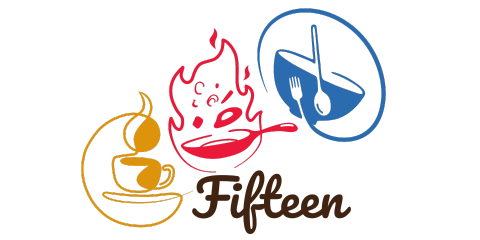


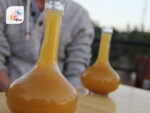
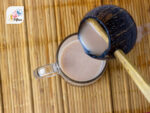
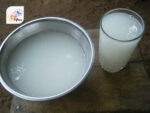
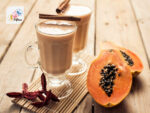
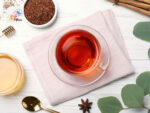
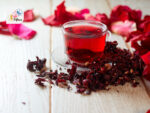
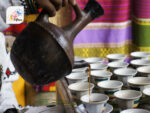
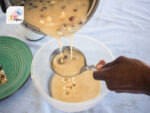
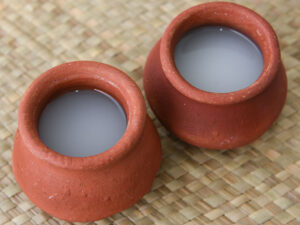
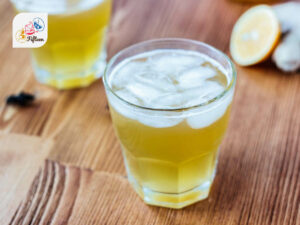
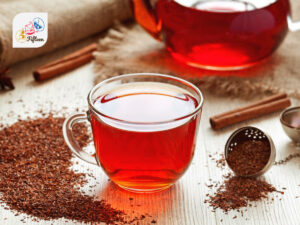
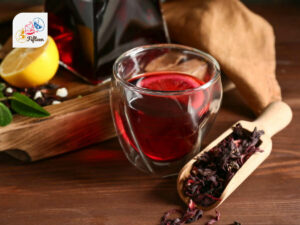
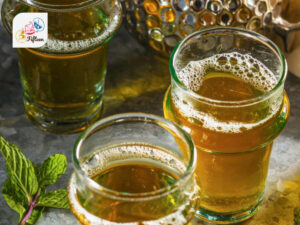
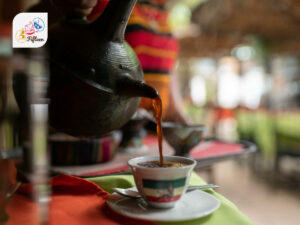
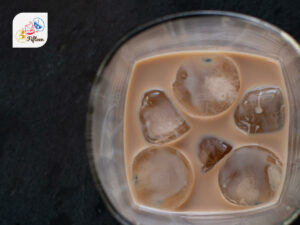
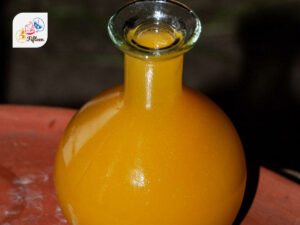
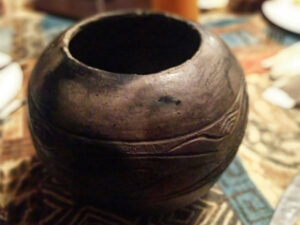
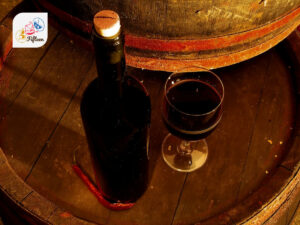
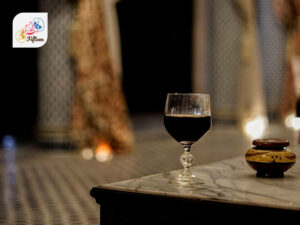
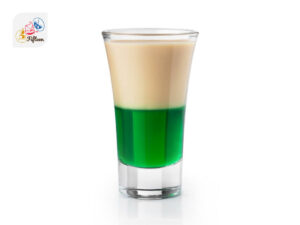
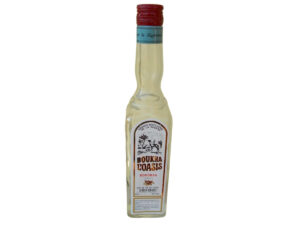
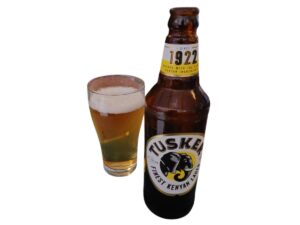
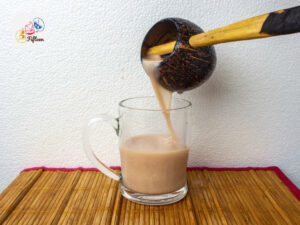
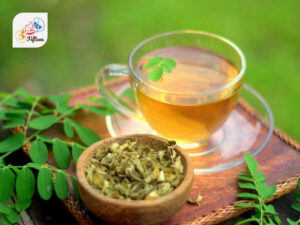
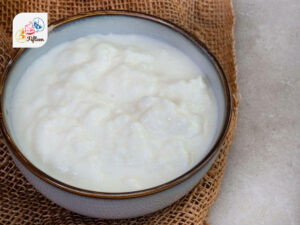
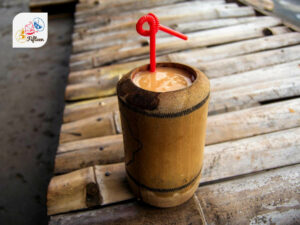
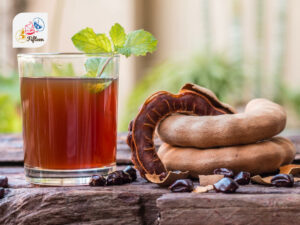
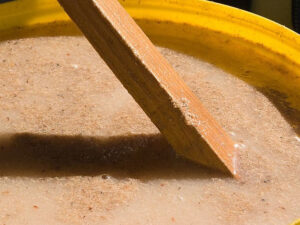
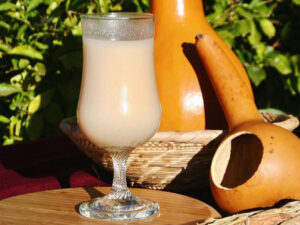

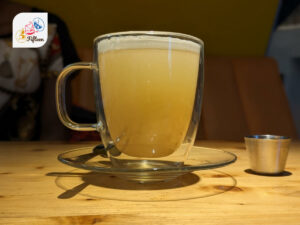
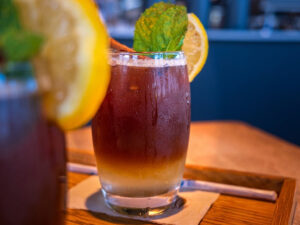
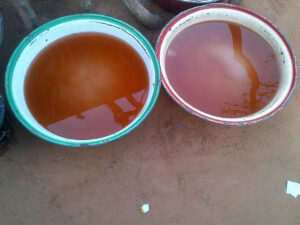
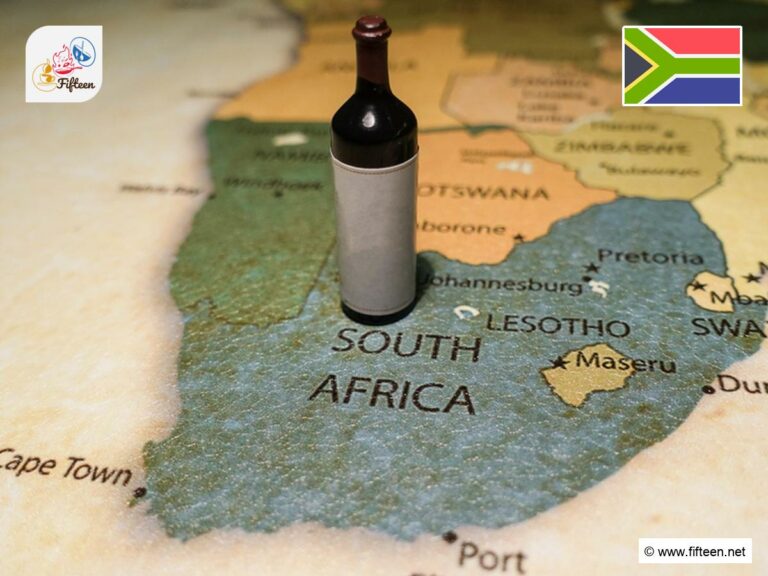
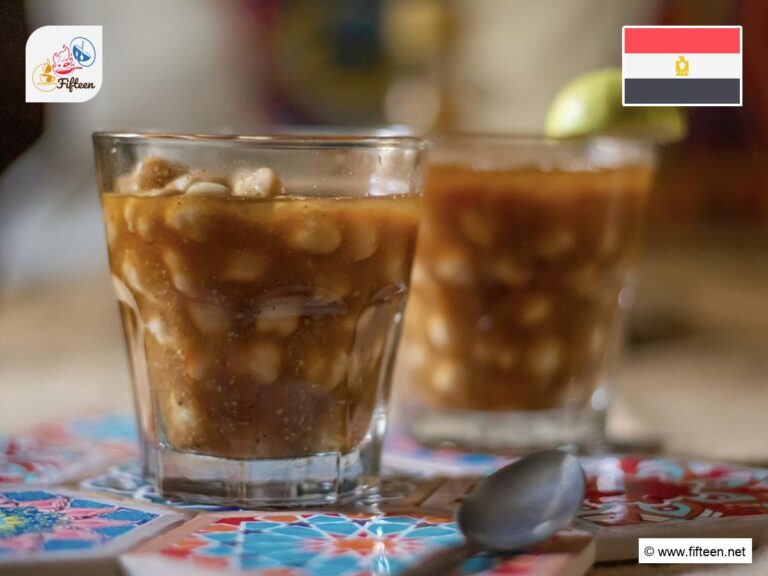
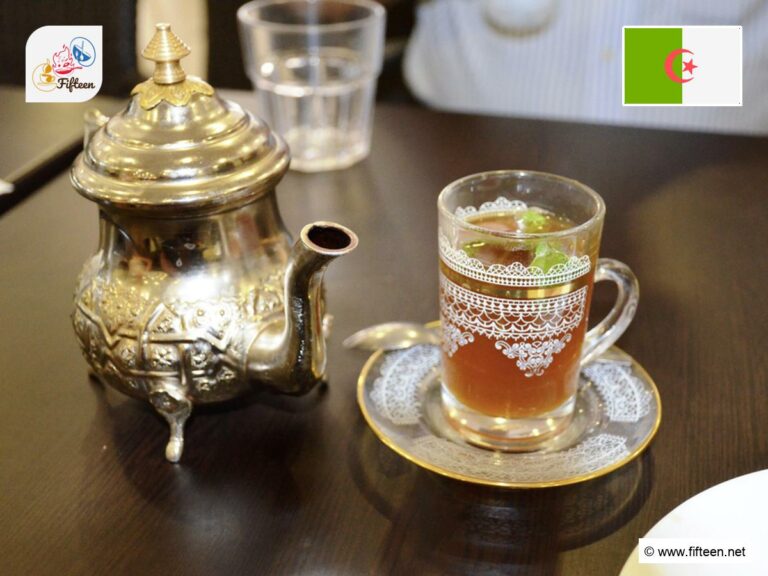
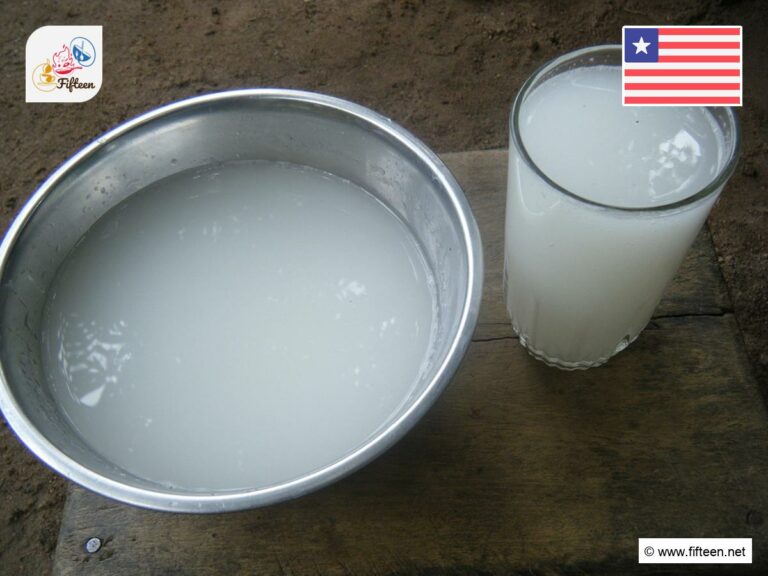
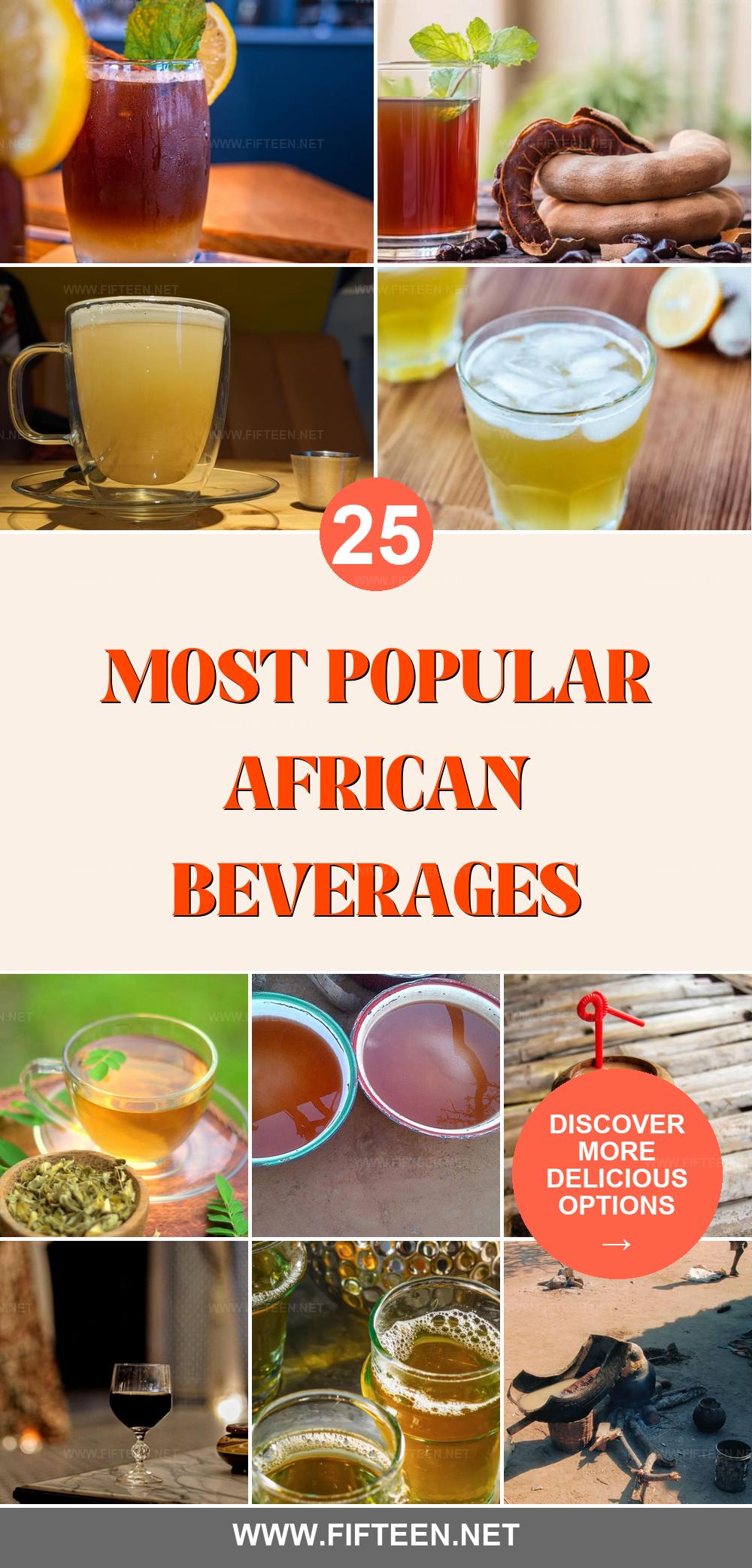
Jamie Scott
Editor in Chief, Senior Content Writer
Expertise
Home Cooking, Meal Planning, Recipe Development, Baking and Pastry, Food Editor, Cooking-video Maker, Western Food Evaluation Expert
Education
Le Cordon Bleu College of Culinary Arts
Local Community College, New York, NY
Jamie Scott is a skilled culinary expert and content creator specializing in Western cuisine. With over 15 years in the culinary field and formal training from Le Cordon Bleu, Paris, Jamie deeply understands how to blend nutrition with delicious flavors. His passion for cooking matches his commitment to making healthy eating accessible and enjoyable.
On Fifteen.net, Jamie brings a fresh perspective to classic dishes and beverages, offering readers insightful recipes, cooking tips, and a fresh view on meal planning that emphasizes taste, health, and simplicity.